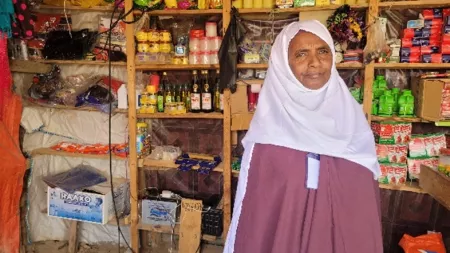Ardo Dhunkel is a woman in Somalia who runs her own small business. Conditions in her village are so extreme that people have to survive on 13 litres of water a MONTH. The international standard for the least amount of water one person should have is 15 litres a DAY. This is so extreme that I can hardly imagine it. But Ardo runs her business anyway, and is the chair of her local savings group.*
The crisis in Ukraine and years of drought have hit Ardo hard. “It is hard. I don't have enough customers. Now, most people buy on loan because they no longer have an income due to the current drought. … Every month, we get less to eat…”
Ardo and her savings group are doing their best. They are gamely working to eke out the most they can in brutal conditions. They are fierce and resilient. They cannot do it alone. “We are in great need. We need more help so we can survive.”
Women like Ardo are just some of the people we are working to support. Whether it’s helping with a business, trucking in water, giving people cash, or working to set up savings groups, CARE is continuing its humanitarian mandate.
Between July of 2021 and June of 2022, CARE has reached 21 million people directly in 53 countries with humanitarian response. That’s 8% of the people who need help in the countries where CARE operates. 50 countries are still doing COVID-19 response, including supporting vaccine rollout in areas where 143.1 million people have gotten COVID vaccines. 466,600 people have gotten support in 5 countries as part of CARE and our partners’ response to the crisis in Ukraine.
What changed?
- People get water, soap, and hygiene. 7.1 million people got WASH services. In Chad, women are making the soap that goes into hygiene kits for refugees.
- More people can eat food. 4.2 million people received nutritious food. In some districts of Mali, CARE and our local partners are the only people providing any support to food security. In Honduras, 10,662 (including 3,286 women) got cards to buy food and transport services. In Tonga, the team is helping women build home gardens to recover from COVID-19 impacts. In Syria, the team helped farmers grow more wheat—at a time when wheat is in desperate need.
- Health services are available for people. 3 million people got health services, and 526,000 people specifically got access to sexual and reproductive health services. In Nepal, the team worked with health workers to keep contraceptives available even when COVID-19 was shutting down health services. They also helped local health centers rollout COVID-19 vaccines without shutting down the typhoid vaccine campaign. Peru helped community health workers support 4,633 people access health services, and is helping stand up community mental health centers and reduce stigmas around mental health needs.
- People have money to spend. 2.1 million people got cash or vouchers. In Poland alone, 10,033 people got cash as they migrated across the border from Ukraine.
- There are stronger livelihoods. 2 million people got livelihood services.
How did it happen?
- Focus on the people who need help the most. CARE India is reaching out to people in the most underserved community, and those who have no support from the government or other actors. Mozambique is reaching out to new areas in the north where no other actors are operating. Niger operates in communities in the Sahara where no other groups are supporting communities.
- Think for the long term. In Bangladesh, the team installed a huge number of solar streetlights to prevent GBV. In Ethiopia, the team helped build solar water pumps to keep water flowing for more than 7,350 people. In Syria, we operate 20 water stations that serve 335 IDP camps. CARE Pakistan helped hospital rebuild their water supplies and renovate so they can serve patients and invest in COVID-19 vaccines. This long-term infrastructure will continue to support people for years.
- Work with local partners. The Balkans region continues to build and grow strong local partnerships and bring in new partners to work with. Niger just launched a new humanitarian partnership platform. In Ukraine, Poland, Moldova, and Romania, CARE started up new partnerships to work with local groups to support people affected by the crisis. In Romania alone, we’re working with 28 local partners who are mostly focusing on GBV and protection.
- Be fast and flexible: In Zimbabwe, the team can respond to crisis within 72 hours. Burkina Faso, Somalia, and Ethiopia all talked about how they are speeding up their rapid response and ability to be adaptable as contexts change.
- Support women’s businesses. In the Balkans, the team gave grants to women who’s businesses were under threat from pandemic-related closures, and helped keep businesses open. In Chad, women who got training to make soap sold their soap to providers CARE works with to make a profit and increase handwashing—and that soap became part of emergency hygiene kits other women recieved. In Yemen, after women attended business training, 44% of savings groups loans went to helping women build small businesses. 96% of people in Nepal’s economic recovery program were able to re-establish their businesses.
- Invest in understanding context: 38 countries did Rapid Gender Analysis, and 30 countries are ensuring that women are participating in planning and decision making. 49 countries are using feedback and accountability mechanisms, and 33 of them make sure communities help design the feedback systems. In Myanmar, investing in needs assessment helped CARE shape overall UN and Humanitarian responses in partnership with others.
*This is drawn from a story by Sarah Easter, Emergency Communications Officer in CARE Germany and Austria
